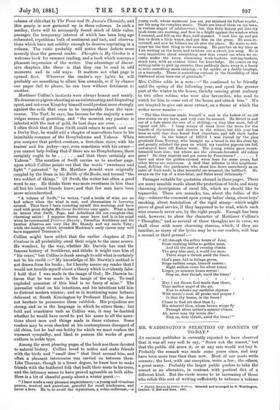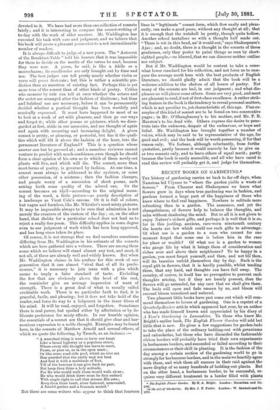MR. WADDINGTON'S SELECTION OF SONNETS OF TO-DAY.* AN eminent publisher
is currently reported to have observed that it was all very well to say, "Scorn not the sonnet," but that the public did scorn it, or at any rate would not buy it. Probably the remark was made some years since, and may .have been more true then than now. Most of our poets write sonnets ; the best, with one exception, write a few ; the others, a great many. Probably the larger public prefers to take the sonnet as an alterative, in contrast with poetical diet of a different kind. But the circle seems to be increasing of those who relish this sort of writing sufficiently to welcome a volume
• English Sonnets by Lining Writers. Selected and arranged by S. Waddington. London: G. Bell and Sons. 1881.
devoted to it. We have had more than one collection of sonnets lately ; and it is interesting to compare the sonnet-writing of to-day with the work of older masters. Mr. Waddington has executed his task with care and judgment, and we believe that his book will prove a pleasant possession to a not inconsiderable number of readers.
It is always difficult to judge of a new poem. The "Autocrat of the Breakfast-Table" told his hearers that it was impossible for them to decide on the merits of the verses he read, because they were new. A poem, he said, is like a fiddle or a meerschaum ; its excellencies are only brought out by time and use. The best judges can tell pretty nearly whether violin or verse will prove first-rate ; but this is rather a scientific pre- diction than an assertion of existing fact. Perhaps this is yet more true of the sonnet than of other kinds of poetry. Critics who measure by rule can tell at once whether the octave and the sestet are arranged after the fashion of Guittone ; but time and habitual use are necessary, before it can be permanently decided whether a poetical thought has been worthily and musically expressed. It must have happened to most of us to look at a work of art with pleasure, and then go our ways and forget it ; while other poems or pictures, which we disre- garded at first, abide in our memories, and are thought of again and again with recurring and increasing delight. A given sonnet is pretty, or pleasing, or powerful, but has it the quali- ties which will lift it above the fashion of the hour, into the permanent literature of England ? This is a question whose answer can but be guessed at ; and a nameless reviewer cannot venture to predict with much confidence, even though he should form a clear opinion of his own as to which of these newly-set plants will live, and which will die. The sonnet, more than most forms of poetry, is governed by fashion. At one time, a sonnet must always be addressed to the eyebrow, or some other possession, of a mistress ; then the fashion changes, and people weary of a succession of short poems, each setting forth some quality of the adored one. Or the sonnet becomes an idyll—according to the original mean- ing of the word, a little picture—as purely descriptive of a landscape as Vicat Cole's canvas. Or it is full of colour, but vague and formless, like Mr. Whistler's most misty pictures. It may be impossible always to be sure that admiration is not merely the creature of the custom of the day ; or, on the other hand, that dislike for a particular school does not lead us to reject a really fine poem. This difficulty applies in some degree even to our judgment of work which has been long approved, and has long since taken its place.
Of course, it is not strange that we find ourselves sometimes differing from Mr. Waddington in his estimate of the sonnets which are here gathered into a volume. There are among them some which we believe will stand almost any test, and most, if not all, of these are already well and widely known. But when Mr. Waddington claims in his. preface for this work of one generation that it can almost "rival that of all its prede- cessors," it is necessary to join issue with a plea which seems to imply a false standard of taste. Excluding the few that are obviously above the level of the rest, the remainder give an average impression of want of strength. There is a great deal of what is usually called creditable work. There is no particular fault to find, it is graceful, facile, and pleasing ; but it does not take hold of the reader, and force its way to a lodgment in the inner -fibres of his mind. It will be read, enjoyed, and forgotten. Sometimes there is real power, but spoiled either by affectation or by de- liberate preference for misty effects. In our humble opinion, the essentials of a sonnet are that it should give clear and har- monious expression to a noble thought. Examples may be found here, in the sonnets of Matthew Arnold and several others, of which we quote the following, by Trench, as an instance :—
"A wretched thing it were to have our heart Like a broad highway or a populous street, Where every idle thought has leave to meet, Pause, or pass on, as in the open mart ; Or like some road-side pool, which no nice art Has guarded that the cattle may not beat And foul it with a multitude of feet,
Till of the heavens it can give back no part. But keep thou thine a holy solitude, For He who would walk there would walk alone ; He who would drink there must be first endned With single right to call that stream His own; Beep thou thine heart, close fastened, unrevealed, A fenced garden and a fountain sealed."
But there are some writers who appear to think that fourteen lines in " legitimate " sonnet form, which flow easily and pleas- antly, can make a good poem, without any thought at all; that it is enough that the nutshell be pretty, though quite hollow. Another school tantalises us with a thought half made out. "There is wit in this head, an' it would out," says Shakespeare's Ajax ; and, no doubt, there is a thought in the sonnets of these gentlemen, only they prefer to paint things as seen by short- sighted people,—so blurred, that we can discover neither outline nor subject.
But if Mr. Waddington would be content to take a some- what lower standard for his collection, and not force us to com- pare the average merit here with the best products of English literature, we should gladly admit that the book will be a welcome addition to the shelves of all lovers of poetry. Not many of the sonnets are bad, in our judgment ; and what dis- pleases us will please some others. Some are very good, and most are pleasant to read, if not of first-class excellence. A rather strik- ing feature in the book is the tendency to reveal personal matters, which is not peculiar to, yet characteristic of, this age. Fine ex- amples of this kind of sonnet are to be found on two consecutive pages ; in Mr. O'Shaughnessy's to his mother, and Mr. P. B. Marston's to his dead wife. Others express the desire to pene- trate into the unknown, despair of the endeavour, or hope and belief. Mr. Waddington has brought together a number of voices, which may be said to be representative of the age, for good and evil ; and the book will be worth possessing, if for that reason only. We forbear, although reluctantly, from furthe quotation, partly because it would scarcely be fair to give on or two sonnets only, and to leave others of equal merit ; partly because the book is easily accessible, and all who have cared to read this review will probably get it, and judge for themselves.



































 Previous page
Previous page